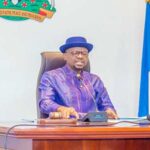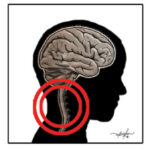On Thursday March 19, 2020 Governor Darius Ishaku returned to Jalingo, the Taraba State capital, after a prolonged absence from the state on account of an undisclosed illness. The multitude that came to welcome him at the airport were there largely to confirm whether the governor had truly recovered or whether it was going to be a re-enactment of a similar episode when a former governor of the state, the late Danbaba Suntai, who sustained injuries from a plane crash, upon being flown back to Nigeria from the United States of America despite assurances that he had recovered enough to resume his duties, looked differently on arrival.
The arrival of Governor Ishaku that Thursday evening broke the tension and uncertainty in Taraba as a result of the long absence of the governor from office. All through his aides had laboured to explain that government business was not drastically affected by the governor’s absence as according to them, he was still attending to official government duties while in seclusion. They also pointed out that salaries and emoluments were being paid to workers when due.
But even that it was still not enough to douse the tension in the state especially as the constitutional threshold for handing over to the deputy governor following the governor’s absence was nearing. Already there were strident calls both from within and outside Taraba for the state assembly to be ready to do the needful once the threshold was reached.
Taraba is arguably the most endowed state in the country. It is a state teeming with human and natural diversity. The only state in the country with three distinct weather patterns; the temperate climate of the Mambilla plateau in Sardauna akin to the Mediterranean parts of Europe; the tropical climate of Kurmi and Gashaka similar to the one found in the southern parts of Nigeria and the general sub-tropical climate of the savannah belts of the country across the rest of the state.
Underneath the land, are rare untapped solid minerals and hydrocarbons in vast commercial quantities. But what must be Taraba’s greatest endowment is its agricultural potential. Out of these three distinct weather and climatic patterns comes a bio-diversity that makes Taraba State truly nature’s gift to the nation as the state is aptly nicknamed. It is a naturally irrigated state with a river flowing through every local government and rich alluvial soils that can support any type of plantation agriculture. The landscape of Taraba with hills and rock formations, pristine forests, green valleys, rugged woodland and savannah is of bewitching beauty. Taraba is naturally made for tourism, agriculture and industrial production.
But beneath this beauty lies a debilitating ugliness. Taraba is a state at odds with itself. Perhaps no state is as sharply polarised in the country along religious and ethnic lines as Taraba. Looking at the diversity and the close cultural affinities of all the ethnic groups in the state this ought not to be so. No ethnic group in the state is overwhelmingly dominant in population. There are no settler-indigene issues in Taraba because all ethnic groups are indigenous to the state. And in all the ethnic groups in the state there are adherents of the Christian, Islamic and Traditional religious faiths mostly within same families.
Taraba is at odds with itself mainly because from the time of its creation to date, some well positioned individuals and groups in the state have taken it upon themselves to designate it as belonging exclusively to a particular faith. This is the unwritten constitution of Taraba wherein everything from appointments, promotion employment, citing of projects, political representation etc, follows.
Nowhere is this unwritten constitution glaringly implemented than in southern Taraba where Governor Ishaku comes from. Of the five local governments of southern Taraba, Takum from where the governor hails takes three of the four political slots available. Apart from the governor, the member representing Wukari-Ibi federal constituency is from Takum. The member representing Donga-Takum-Ussa is also from the Takum axis. If you consider that the Senator representing the entire southern Taraba is from Donga which is closer in affiliation to Takum, you get a sense of the total domination of the Takum axis of the political representation of southern Taraba.
Taking this deliberate exclusion further, of all the statutory political appointments made in the entire southern Taraba, Muslims who constitute conservatively up to 45 per cent of the population were not included.
This unwritten rule is applied in the entire state apparatus to the letter. In the civil service, Muslims who qualify to be promoted to the next position are routinely passed over in favour of their less qualified juniors. In a state with 50-50 Christian and Muslim population, the latter occupy less than 20 per cent of positions in mainstream government, board and parastatals.
This is by design. The intention is to impoverish the Muslim population and render them politically prostrate in pursuance of the unconvincing designation of the state as a belonging exclusively to a particular religion. In Taraba, there is no attempt at fairness and inclusion. The constitutional provision which states that there should be no discrimination based on religion, among others, certainly does not apply in Taraba.
Governor Ishaku on his second and last term in office needs to raise Taraba above this nether level of politics and governance. He hardly needs further distraction. He needs all hands on deck. But he must first engender confidence of all Tarabans through politics of inclusiveness. The lack of it is without doubt is one of the main reasons why Taraba has not been able to live up to its potentials. And it is now coming home to roost with the Governor himself fiercely at odds with some of his closest political associates. This reinforces the image of Taraba being a dysfunctional state perpetually at war with itself. For a state so well endowed by nature, this is indeed unfortunate.
 Join Daily Trust WhatsApp Community For Quick Access To News and Happenings Around You.
Join Daily Trust WhatsApp Community For Quick Access To News and Happenings Around You.


